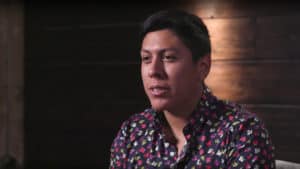By Diana Miranda
July 17, 2020
Diana Miranda, a rising senior at Rhodes College and current MIA intern, shares her perspective on growing up undocumented, the discourse around DACA, and the intersection of immigration with race-, class-, and gender-based oppression.
On June 18, the Supreme Court released its much-anticipated decision regarding the legality of the Trump administration rescinding DACA (Deferred Action for Childhood Arrivals). All across the nation, Dreamers, allies, and supporters celebrated – DACA Continues. As a DACA recipient myself, I felt like I was finally able to breathe after years of holding my breath. The years following the Trump administration’s decision to rescind DACA in September 2017 have been full of uncertainty. It is frightening and strange seeing your future fought out on such a great scale. More so, it is difficult to even imagine your future when you don’t know if you will still be able to legally work, maintain your job in your field, or if you will be able to enter the job market after you graduate from high school or college. For now – we can at least rest a little easier knowing that our status as DACA recipients is maintained for the time being.
While I reflected on the decision, on our temporary victory, I thought about how much is left to do and my uncertain future. While this has been a victory, it doesn’t feel right to celebrate when I think about all of the undocumented folks who never had the privilege to have DACA, who never had even the temporary shield against deportation, the security of employment authorization, and the other benefits that come with this status. It also doesn’t feel right to celebrate knowing the limitations of DACA and how it was never really enough. Will I have to continue living my life in 2-year increments? Will I always have to worry that these two years might be the last years I have temporary protection?
I am entering my junior year of college and the time to decide my future is drawing closer and closer. Although I’ve mostly known what I want to do since I was in high school, the path to getting there feels uncertain. My dream is to be an immigration attorney, but I am also interested in civil rights litigation and defending labor rights. Working at Mid-South Immigration Advocates over the past ~2 years has solidified my desire to practice immigration law and given me hope for my future, as well as the future of immigration justice.
My life would be debated in classrooms, there would be think pieces written about people like me, I would always belong to the collective Dreamer, and my life would contribute to the “illegal immigrant” narrative.
I originally became interested in immigration legal work because of my own experiences with the immigration legal system. My parents, older siblings, and I are/were all undocumented for most of my life. When I was about 12-13 years old, my dad was arrested for an outstanding warrant from many years ago that he had no knowledge about. This incident snowballed into a process that would weigh over us for many years. Shortly after his arrest, he was turned over to ICE and sent to an immigration detention center where he would await deportation proceedings. Looking back at that time, it is very difficult to remember the details. I was young; I did not really understand what was going on, and was somewhat sheltered from reality. The gravity of the situation did not really settle in until a couple of years later when my dad faced his first court appearance.
When you grow up undocumented, in an undocumented family, there are certain things that just become part of normal life for you. You become complacent with the situation at hand. You become used to the hurdles and obstacles that make up your daily life. But little by little you become politicized. I’m not sure when this happened to me. Maybe it was when I realized that most people do not have to worry about their dad being deported while entering their teenage years and adjusting to high school. Maybe it started in the classroom, where we debated whether it was okay for my family to be in this country or not. When my peers were allowed to question my existence in this country. Or when those around me were getting their driver licenses, but I couldn’t because I didn’t have any status.
It was through the news and media, that I understood that I was a member of a political and social group known as Dreamers – undocumented folks who were brought to the United States as children, raised in this country, but lacked the rights of citizens. I was not a part of the original cohort of Dreamers, they organized when I was in my infancy, in the early 2000s. Dreamers came to prominence again in 2010-2011, when the DREAM Act was introduced into congress, but not approved. The organizers, activists, and “ordinary people” who made up the Dreamer movement were the ones who marched, protested, petitioned, and fought so that we, as a collective, could have a different future. Their struggles culminated with the institution of DACA by the Obama administration in 2012. I was 11 years old at the time, so I did not qualify for the status yet, nor did I fully understand what it meant. But afterward, there was a security in my family that I had never known before. As I grew older, I at least knew that I would be able to legally work, drive, and live – something that I did not have before.
Throughout this time, there was a realization that my life was political – that whether I wanted to or not, my life would be decided in a political playing field. My life would be debated in classrooms, there would be think pieces written about people like me, I would always belong to the collective Dreamer, and my life would contribute to the “illegal immigrant” narrative. My successes would be celebrated as an example of the value of immigrants, as an example of how much immigrants can contribute to the economy, as proof that immigrants are inherently hardworking. My failures would be used to indicate that undocumented immigrants are here to take up valuable space, that we are inclined to commit crimes, or that we are lazy and want to soak up welfare benefits.
The reality is that immigration discourse has always been riddled with racist and classist undertones. But immigrants are not valuable based on whether they perform skilled or unskilled labor, or on how much they contribute to the GDP – we are valuable because we are humans.
In more recent times, this politicization of my life has manifested itself onto an even greater scale. The rise of Donald Trump into national office has correlated with a rise in anti-immigration rhetoric. When his administration decided to rescind DACA in September 2017, I saw my life and future used as a bargaining chip. It all broke down to – “We’ll give you the DREAM Act for the wall” or “We’ll give you the Dreamers in exchange for harsher immigration laws.” The Republican party offered Dreamers the opportunity for a pathway to citizenship, in exchange for selling out other parts of the immigrant community. The nation was forced to ask themselves, “How do we measure the value of an immigrant? Of a human life?”
For years, under a capitalist system, we have measured this in terms of capital. How much capital can you produce? How do you benefit the economy? Are you a “hard worker?” What type of labor will you perform? Are you willing to have your wages exploited?
The reality is that immigration discourse has always been riddled with racist and classist undertones. But immigrants are not valuable based on whether they perform skilled or unskilled labor, or on how much they contribute to the GDP – we are valuable because we are humans. Over the years, DACA and the DREAM Act have gained public favorability because of strategic framing and respectability politics. Dreamers are portrayed as ideal citizens, who contribute to the economy and do not commit crimes. But, is that framing not just another way of selling out other immigrants? We must stop and think about how these ideas further classist and racist immigration rhetoric.
These past few years of my life, I have worked closely with immigration advocates and other immigrants. And I have learned that the way we discuss immigration discourse in media severely limits the possibilities for a just and empathetic immigration system. I am grateful to MIA for the insights I have had and for the new outlook I have.
I first had the opportunity to work at MIA the summer before my senior year in high school through the MBA Summer Law Intern Program. That summer, I was able to observe what immigration legal work really was and take part in simple, but exciting assignments. I felt true joy and excitement while working there. By the time my internship was over, I knew that I wanted to pursue immigration law and that this was my passion. A little over a year later, I was starting out as a freshman at Rhodes College. At Rhodes, I have the privilege to be a part of the Bonner Program – a community service program and scholarship. Bonner allows me to dedicate 10 hours/week to volunteering at local non-profits with financial support and compensation. Towards the end of my first semester, I reached out to MIA to see if I could begin volunteering for them throughout my Spring Semester. From then on, I have continued to work for MIA through the Bonner program. I have also interned here during the summers. Over these years, I have become attached to the staff here and the work I do.
From all that I have learned, I have been left with an overwhelming desire to continue advocating for a more just immigration system, and really for a more just world.
Working at MIA has given me an opportunity to explore the potential role I want to have in my community. I feel very fortunate to have the opportunity to work with brilliant minds, who genuinely and wholeheartedly care about their clients. Through my time here, I have learned so much about the immigration system – I have worked on immigration applications, drafted legal documents, visited a detention center, attended court hearings, and had countless other opportunities.
While this tangible work and experience is very beneficial in regards to my desire to be an immigration lawyer, what I consider the most valuable is what I have learned about the world from the experiences of the immigrants I have met or whose cases I’ve worked on. I have a better understanding of misogyny, patriarchal structures, the oppression and discrimination of indigenous peoples, global racism, imperialism, etc. In college, I have chosen to explore these topics more deeply – choosing classes that involve critical race and gender theory. I feel better prepared to enter a space like a law school and work to transform the discussions happening there and ensure that when and if I become an immigration lawyer, I can understand the situations the people I am working with are in.
From all that I have learned, I have been left with an overwhelming desire to continue advocating for a more just immigration system, and really for a more just world. I am grateful that while I continue to work to understand my place in this country, I have the tools and mechanisms to evoke some change at the individual level. I’m not entirely sure what my future holds, but I do know that wherever I end up in life, I hope to emulate the love and dedication everyone at MIA has for their work.







